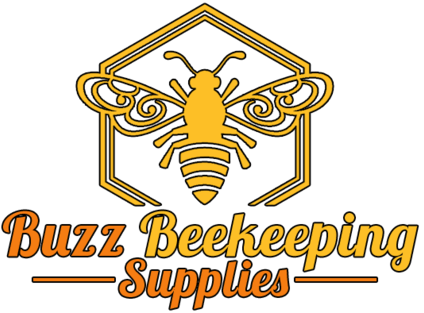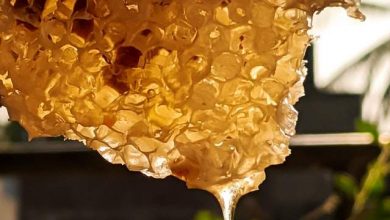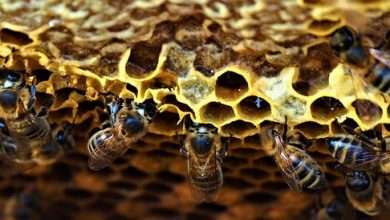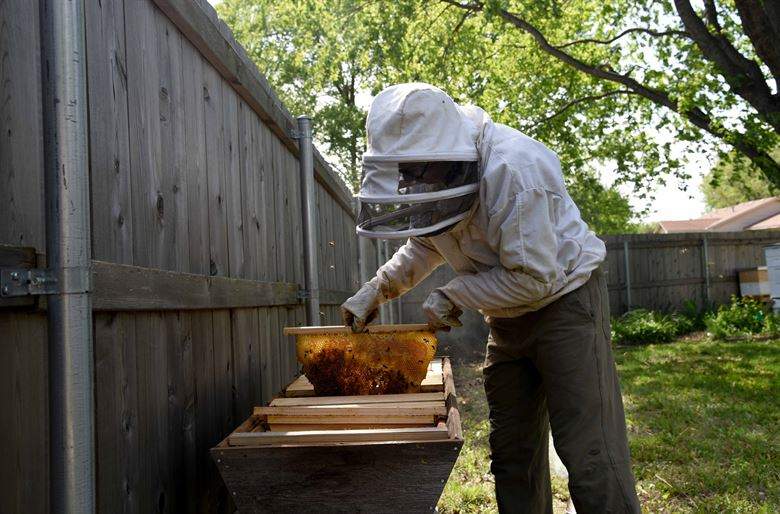Backyard Beekeeping
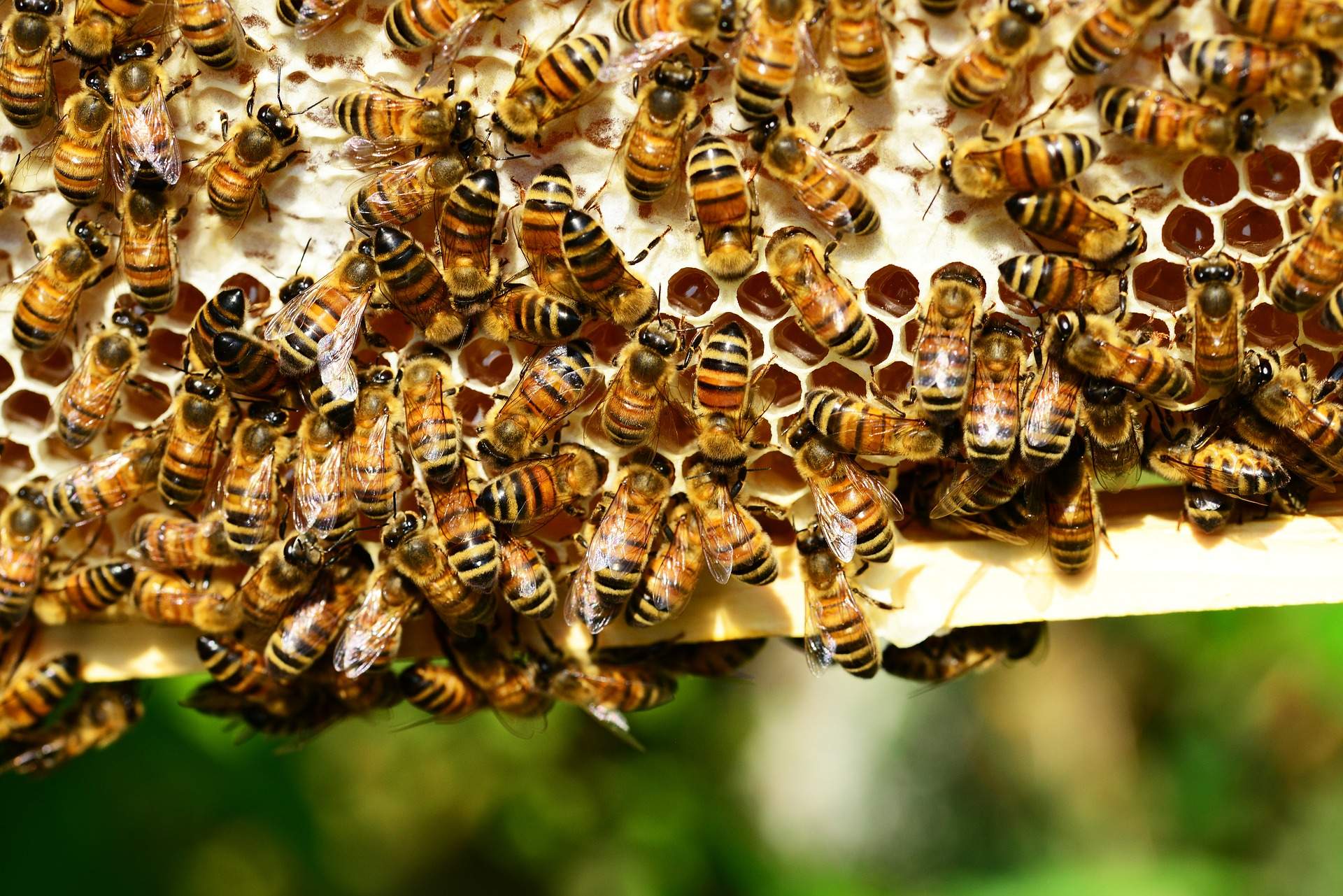
If the thought of having fresh honey available for your enjoyment or to give as gifts to your friends and family virtually anytime you wish appeals to you, or if you are just looking for a fun and 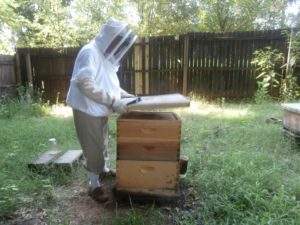 interesting hobby, beekeeping might be just the thing.
interesting hobby, beekeeping might be just the thing.
Even if your space is limited, don’t worry. Bees are very adaptable, so they can be kept in backyards or even city rooftops. Bees do need flowering plants to produce honey, but they often travel several miles to collect nectar and pollen, so it is possible to keep bees virtually anywhere to create a good batch of locally-made honey.
Preventing a Nuisance
A primary concern of many people who keep bees as well as those who live in close proximity to them is the risks they pose. Urban beekeepers should always be vigilant that their hives do not become a nuisance to others, or even appear to pose a problem.
Bee stings are usually the biggest concern from neighbors, but there are ways that a beekeeper can care for their hives that allow neighbors to be safe and comfortable from these concerns.
The Fence
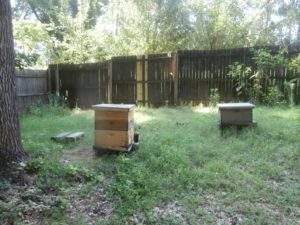 A good fence is an excellent preventive measure for backyard beekeepers. If a fence is not an option, shrubbery that is at least 6-feet tall will serve the same purpose.
A good fence is an excellent preventive measure for backyard beekeepers. If a fence is not an option, shrubbery that is at least 6-feet tall will serve the same purpose.
A fence or good shrubbery forces bees to remain above the heads of others since bees normally travel in straight paths to their hives. A fence or shrubbery also serves as an “out of sight, out of mind” situation for most people as well.
A fence or shrubbery hides most of the evidence that managed bees are in the neighborhood. These barriers also provide wind protection to the hives.
Water
Bees need ready sources of water, especially in early spring and during the heat of summer. Bees can be very all-inclusive when it comes to where they collect water from too. These sources can include pet water bowls, bird baths and swimming pools. To deter bees from getting water from these sources it is a good idea to provide water in close proximity to hives.
Two excellent methods of providing water to bees are to, first, provide a small water garden in a half-whiskey barrel with floating plants. Bees love this since they prefer well-aged water! And second, from a dripping faucet with the water falling onto a wooden board. The dripping faucet method is a little harder to manage since for best results it must be available at all times when bees are flying so they don’t develop the habit of going elsewhere for water.
Bees tend to prefer water that is not too close to their hive, so you should put a water source at least 20 feet away.
Swarm Control
Another big concern of those of keep bees as well as those who live near them is swarming. In this regard, it is important to know that there is no practical way to prevent bees from swarming.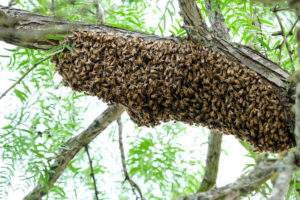
On the other hand, bees swarm primarily as a function of reproducing colonies. As a result, at this stage, they are usually very gentle since they eat a lot of honey before they swarm.
The photograph at left shows a swarm as it is scooped up from a neighbor’s yard.
Colonies that are strong, with good queens, are the most likely to swarm. Of course, colonies that are strong is something to be strongly desired. As a result, beekeepers should keep colonies headed by queens that are young–less than one year old–because they will swarm less and also tend to be strong too. This requires requeening every year with young queens if swarming is likely to be a problem.
Swarming bees tend to cluster within 100 feet of their old hive as scout bees search for a new home.
A good way to prevent bees from reclustering in a neighbor’s yard is with a “bait hive,” which is simply an attractive home that is made available for the swarm to discover. A good bait hive can be made from an old hive body or a nuc hive that is at least one cubic foot in volume with an opening about one or two square inches.
The ideal place to put a bait hive is in a shady place that is protected from the wind and from between 10 and 30 feet from the hives. This hive should also be about 10 feet off the ground, such as under the eve of a house or between the branches of a tree.
Bees also prefer to live in a place where bees have lived before, so a bait hive that has an old frame of honeycomb or otherwise has a good bee smell in it will be more attractive to them.
Working the Bees
As they are working inside of the hive, it is possible that an angry bee will find an innocent person 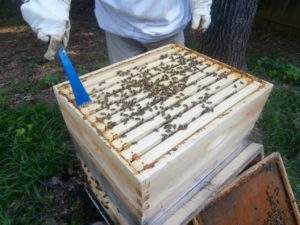 (other than the beekeeper) to be a good target with a sting. Fortunately, there are ways to prevent this from happening.
(other than the beekeeper) to be a good target with a sting. Fortunately, there are ways to prevent this from happening.
Environmental conditions are a huge influence on the defensiveness of bees. As a result, a beekeeper who works with the bees when conditions are favorable will be less likely to have problems with angry and aggressive bees.
The best conditions to work with bees under are when:
- Most field bees are in the field collecting nectar
- When there is a nectar flow from flowering plants
- When the colony is not under stress from predators such as wasps
- When colonies are not in direct sunlight
- When temperatures are not very hot (95 degrees F or higher)
- When neighbors are not having a lawn party or mowing their yard
Perhaps the best advice regarding bee sting prevention is Langstroth’s first Bee-keeper’s Axiom: “Bees gorged with honey are not inclined to sting,” which means that bees tend to be gentle when there is nectar flow, when they swarm, and following a light smoking.
It has also been observed that bees who are accustomed to movement around their hive are also less likely to be defensive, so having bushes, trees, a flag, or some other object that moves in a gentle wind are worth using.
Angry bees are sometimes attracted to lights at night. Bees do not normally fly at night, but if a predator or something else has disturbed the hive, a few bees may attempt to sting the neighbor’s porch light. For this reason, it is usually best that a porch light not be within view of the hive.
Another possible problem when bees are in the vicinity is “Yellow rain,” which is harmless bee fecal matter that they rid themselves of to cool off.
Species of Bees
The most common strains of bees are gentle enough to be kept in a city. In areas of the northern US, the Carniolan race is most popular among beekeepers. In the southern US and Mexico, the Italian bee is preferred.
Bees and the Law
Relatively few communities in the US outlaw beekeeping, but it is also worth noting that most do have “nuisance laws” that limit many things that most people would consider objectionable. This includes smelly things, barking dogs, and yes, bees.
Some communities have laws that put restraints on beekeeping such as limits on distances of hives from structures such as homes and the number of hives that are permissible on a property.
It is important that prospective beekeepers learn about any legal restrictions on bees before keeping them. Regardless of the law, good beekeepers keep their bees from becoming a nuisance. Periodically sharing a jar of honey with neighbors is a good idea too.
Farm and Garden Apiaries
Many beekeepers who are unable to keep their hives at home often make arrangements to keep bees on nearby farms and other fields. It is critical that prior to doing this that you get the permission of the landowner. Local beekeeping organizations can be of immense help in determining a good location to raise bees.
1. Ventilated Suit – https://amzn.to/2D1hJBu
(NEW) Ventilated Jacket – https://amzn.to/2Av6piJ
2. Beekeeper YKK Suit Combo – https://amzn.to/2Xk3xLz
3. Beekeeper Journal – https://bit.ly/3xXxFl2
4. YKK Suit – https://amzn.to/2IDJALO
5. Beekeeper Jacket – https://amzn.to/2FirwTW
6. Beekeeping Gloves:
– Goatskin Beekeeping Gloves – https://amzn.to/2GYxBZW
– Cow Leather Beekeeping Gloves – https://amzn.to/2uiSExd
7. Queen Marking Kit – https://amzn.to/2Wm1kCw
– Queen Marking Pens – https://amzn.to/3c4vE8y
–Queen Marking Cage – https://amzn.to/2TDwwdQ
